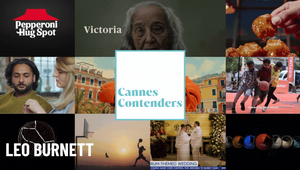
5 Minutes with… Tine Holzhausen

AI is an ongoing point of both contention and discussion, yet craftsmanship and purpose remain important to the industry, if the focus of this year’s Cannes Lions festival is anything to go by.
While the festival reflected a thriving creative landscape – with Germany scooping up 51 Lions, including three Grands Prix – the topic of how AI is influencing the craft of advertising was never far from conversation.
LBB’s Olivia Atkins spoke with Leo Burnett Germany’s newly-appointed CCO, Tine Holzhausen, to chat about the delicate balance between automation and human creativity, and what the future holds for the industry in such a rapidly-evolving landscape.
LBB> Germany is known for its strong tradition of craftsmanship. How is AI being integrated into the practice of craft and what impact do you think it’s having on the quality and authenticity of ideating?
Tine> Generative AI will not replace craft, it will be one way to do craft. I think AI will push craftsmanship forward. The more AI visuals flood the world, the more craftsmanship will help to make brands stand out.
AI can be a powerful tool to enhance the iterative ideation process, create unseen visuals, personalise and customise. But it will not replace the unique human touch that defines craftsmanship. The authenticity and quality of ideas still relies heavily on human intuition and creativity.
LBB> In the German creative industry, particularly in advertising, how is AI influencing the balance between human creativity and automation? Are there specific areas where AI enhances creative output or potentially stifles it?
Tine> At the moment, there are a lot of cases where AI is used just for AI's sake. Which will be no news soon. But what AI will keep doing is taking over simpler tasks like increasing efficiency and productivity by automating repetitive tasks, increasing speed of mockup-generation and creating initial drafts of content. Which is great, because it's freeing up time for deeper ideation and creativity.
But AI is relying on existing data and frequent patterns, which leads to repetitive and predictable outputs and lacks true innovation and originality in some parts. So, human creativity still needs to ensure that the AI's contributions are not just efficient but also enriched with emotional and cultural depth.
LBB> How are German advertising agencies such as Leo Burnett leveraging AI to create more personalised and effective campaigns? Could you share examples of successful AI-driven advertising initiatives that you’ve seen?
Tine> At Leo Burnett Germany, we have had creative technologists working in partnership with our creatives for years, they’ve been very much part of the ideation stage from the get go. Which means that AI is organically implemented into our work and there are great opportunities for opening new possibilities.
Our ‘Climate Realism’ campaign for WWF is a good example of how AI can help to make things better understood. In this case, we wanted to make climate change more tangible, so we applied current climate conditions to famous paintings, using AI to modify the work of some of the world’s greatest artists including Van Gogh and Claude Monet. It helped viewers to question what Monet's landscapes would look like if climate change continues. The campaign was a good example of how AI can translate data into an impactful brand experience.
LBB> What are some of the perceived limitations of AI when it comes to creativity in the German context? Are there certain areas where human intuition and experience still outshine AI?
Tine> Human intuition and experience are irreplaceable in areas like storytelling, emotional appeal, and understanding cultural contexts. The best creative ideas are often the unexpected ones. It might be something you see in the U-Bahn (German’s subway) or a conversation which makes an idea pop, the human things you can’t calculate.
AI relies on existing data, which can perpetuate biases and lack the ability to truly innovate or surprise. So, we are still ahead of AI when it comes to creating unexpected, outstanding ideas.
LBB> How is AI being incorporated into craft and design education within the creative sector in Germany? Do you know of any initiatives that equip future artisans and designers with how to work alongside AI?
Tine> We are currently in the baby stages of the AI Age. And of course, the tech needs training and constant refining. At Leo Burnett Germany, everyone has access to a range of AI tools which we support with ongoing training, education and inspiration. On a group level, Publicis has designed an AI-driven personalised learning platform for all of our employees around the world to use known as CoreAI. The group has built a long-term strategy to develop AI-powered data and intelligence across all of its agencies.
Fortunately, German educational institutions are starting to offer courses for how to work alongside AI. So, a new generation of AI natives are on the cusp of making the world turn even faster.
LBB> Looking ahead, what do you see as the future role of AI in shaping the creative industries in Germany? How might it redefine the boundaries of what is considered craft and creativity?
Tine> AI will disruptively change many workflows and processes from the ground up. It will make things that we cannot even imagine possible. It will redefine the boundaries of craft and creativity with new tools and methods for ideation, design and execution.
But human emotion, intuition and understanding of culture will remain central to creative work. Our founder Leo Burnett famously said, ‘The work of an advertising agency is warmly and immediately human. It deals with human needs, wants. dreams and hopes. Its ‘product’ cannot be turned out on an assembly line.’ And I really believe that the most successful campaigns will be the ones that seamlessly merge the strengths of AI with the irreplaceable qualities of human creativity.












